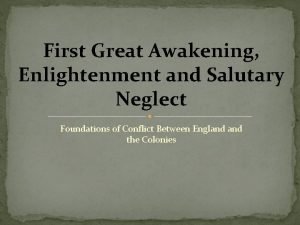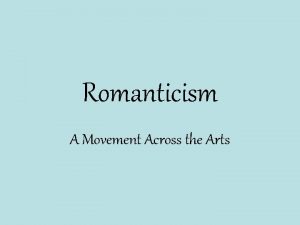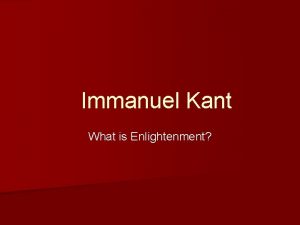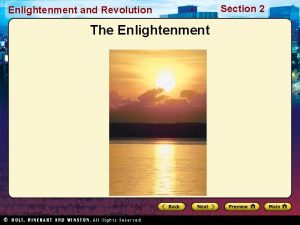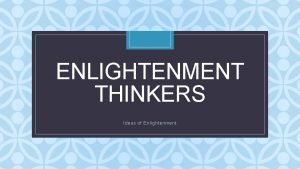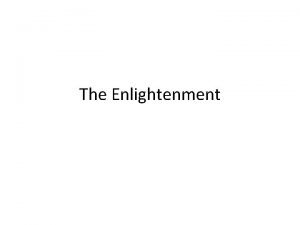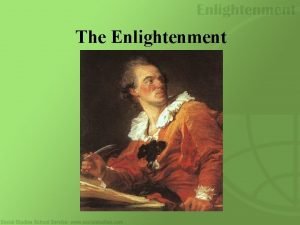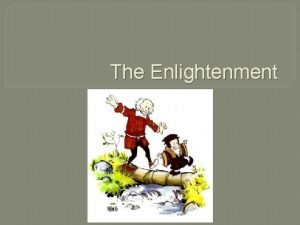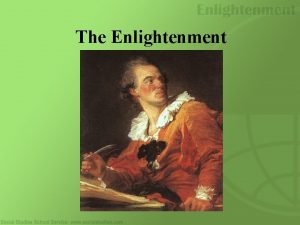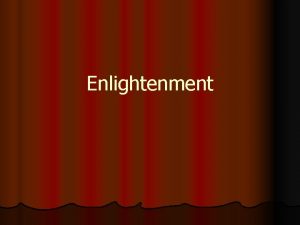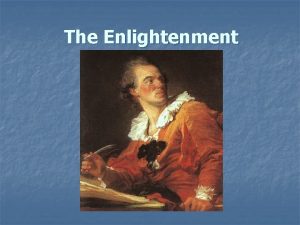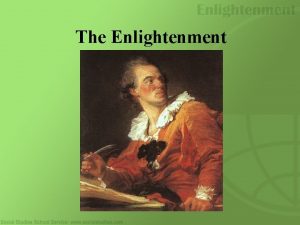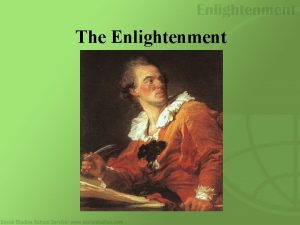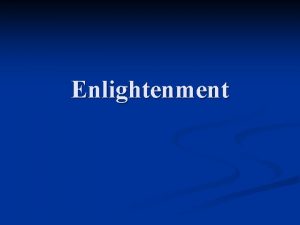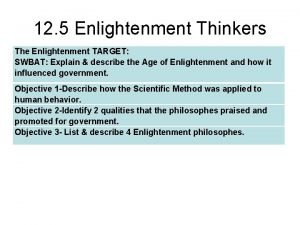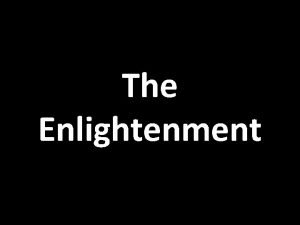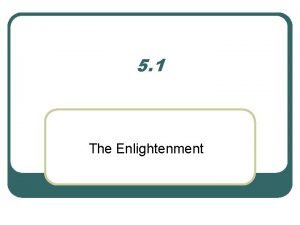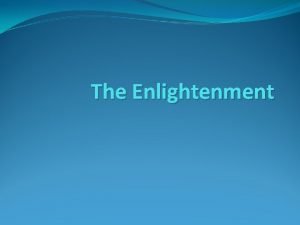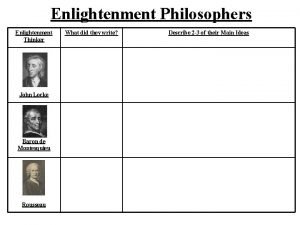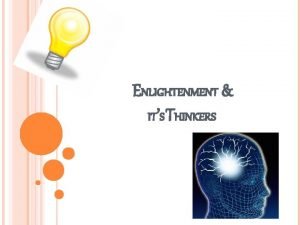The Enlightenment What Was the Enlightenment The Enlightenment












































- Slides: 44

The Enlightenment

What Was the Enlightenment? The Enlightenment was an intellectual movement in Europe during the 18 th century that led to a whole new world view.

According to the 18 thcentury philosopher Immanuel Kant, the “motto” of the Enlightenment was “Sapere aude! Have courage to use your own intelligence!” (Kant, “What Is Enlightenment? ” 1784) Immanuel Kant

The Scientific Revolution The Enlightenment grew largely out of the new methods and discoveries achieved in the Scientific Revolution The equatorial armillary, used for navigation on ships

Francis Bacon and the Scientific Method Sir Francis Bacon • laid theoretical groundwork for what became known as the scientific method • believed that all scientific research should rely on careful observation and experimentation rather than simply relying on one’s own thought and reasoning, as earlier scientific thinkers

Isaac Newton and the Scientific Method • Newton’s achievements using the scientific method helped inspire Enlightenment thinkers • if the scientific method had worked so well for finding scientific truth, perhaps it could be applied to social sciences as well so that the truths about society itself could be discovered. Sir Isaac Newton

Enlightenment Principles • Religion, tradition, and superstition limited independent thought • Accept knowledge based on observation, logic, and reason, not on faith • Scientific and academic thought should be secular A meeting of French Enlightenment thinkers

The French Salon and the Philosophes • Madame de Pompadour • Salons: gatherings for aristocrats to discuss new theories and ideas • Philosophes: French Enlightenment thinkers who attended the salons Madame de Pompadour


Enlightenment Thinkers

Voltaire (1694– 1778) • Most famous philosophe • Wrote plays, essays, poetry, philosophy, and books • Attacked the “relics” of the medieval social order • Championed social, political, and religious tolerance

Diderot The Encyclopédie • Major achievement of the philosophes • Begun in 1745; completed in 1765 Frontspiece to the Encyclopédie

Wigs

Shoes of the Era

Button-making

The Encyclopédie (continued) • Denis Diderot and Jean Le Rond d’Alembert • Banned by the Catholic Church because of Deism Encyclopédie editor Denis Diderot

Deism • Deists believed in God but rejected organized religion • Morality could be achieved by following reason and their own faith rather than the teachings of the church Lord Edward Herbert of Cherbury, founder of deism

Deism (continued) Thomas Paine • Deists viewed God as The “great watchmaker” • …whose creation- the universe- operated as smoothly as a fine Swiss watch • Goal of enlightened thinkers was to discover the principles that governed the functioning of this “watch”

Thomas Hobbes (1588– 1679) • Applied rational analysis to the study of government • Attacked the concept of divine right, yet supported a strong monarchy • Believed that humans were basically driven by passions and needed to be kept in check by a powerful ruler

John Locke (1632– 1704) • The “State of Nature” • He believed that all men were equal in the state of nature because they were “creatures of the same species and rank” with the “same advantages” and “same faculties. ” • Tabula rasa /blank slate

Locke (continued) • Treatises of Government attacked the divine right of kings and authoritarian government • promoted a constitutional monarchy • Natural Rights: defend one’s “property”…his “life, liberty, and estate”.

Jean-Jacques Rousseau (1712– 1778) • Philosophized on the nature of society and government • Births the idea of “General Will” and the Republic in France… • The Social Contract

Baron de Montesquieu (1689– 1755) • French noble and political philosopher • The Spirit of the Laws • Separation and balance of powers ; admired the British model

Montesquieu (continued) • Separation of powers: legislative, executive, and judiciary • Constitutional monarchy idea leads later to American “checks and balances” Frontspiece to The Spirit of the Laws

Women and the Enlightenment Mary Wollstonecraft • Changing views • Role of education best way to develop a person. • Equality Olympe de Gouges advocated

Mary Wollstonecraft • Declaration of the Rights of Man prompted her to outline her philosophy about inequality between the sexes • A Vindication of the Rights of Women(1792)

Wollstonecraft (continued) • Advocates that denying women Education denies them of the tools needed to properly exercise their reason. • Marks the beginning of the Women’s rights movement Title page of Wollstonecraft’s Thoughts on the Education of Daughters

Olympe De Gouges • Criticized the French Revolution • The Rights of Women • “Declaration of the Rights of Woman and the Female Citizen” • Executed in 1793

How Might the Enlightenment Affect Absolute Monarchs?

“Enlightened Monarchs” • Most of Europe ruled by absolute monarchs • Receptive to Enlightenment ideas • Instituted new laws and practices Enlightened Monarchs • Frederick II, Prussia • Catherine the Great, Russia • Maria Theresa, Austria • Joseph II, Holy Roman Empire • Gustav III, Sweden • Napoleon I, France

Frederick the Great (ruled 1740– 1786) • Prussian ruler • Had a strong interest in Enlightenment works • Induced Voltaire to come to Prussia

Frederick the Great (continued) Painting titled “Frederick the Great and Voltaire. ” • Wanted to make Prussia a modern state • Reforms: - Religious freedom -improved education - Outlawed torture

Catherine the Great (ruled 1762– 1796) • Russian ruler • Well-versed in Enlightenment works • Credited for “Westernizing” Russia • Corresponded with Voltaire & Diderot

Catherine the Great (continued) • - Domestic reforms: improves Russian law & society Promoted education Relaxed censorship • Peasant revolt led to her strengthening serfdom and giving nobility more power to have control over them

Maria Theresa (ruled 1740– 1780) • Austrian ruler • Government reforms: centralized & streamlined military • The serfs: reduced some of the power nobility had over them • Son—Joseph II

Joseph II (ruled 1765– 1790) • Ruled as co-regent with his mother until 1780 • Joseph’s reforms • Religious toleration of Protestants & Jews • Control over the Catholic Church • Abolition of serfdom!

Gustav III (ruled 1771– 1792) • Swedish ruler • Read French Enlightenment works • Reforms: - freedom of the press - abolished torture - encouraged free trade • Mid 1780’s he goes back to Absolutism

Napoleon I (1799 -1815) • Italian/Corsican born. French ruler • Military career for the French at age 16 • Rise to power through military successes & in 1799 engineers a coup d’etat that effectively ends the French Revolution

Napoleon I (continued) • Not “really” an enlightened monarch, because he didn’t consciously seek to implement Enlightenment principles. • Reforms • Education: public schools for all • Law: uniform set of laws known as the Civil Code of 1804; guaranteed equality for all male citizens and the right to secure wealth and private property

The Enlightenment and the American Revolution • Influenced The Declaration of Independence - Locke’s concepts of natural rights and equality in the “state of nature” can be seen Thomas Jefferson

The U. S. Constitution • Montesquieu’s endorsement of separating powers of government into three branches; thus creating Checks and balances is put into practice Painting depicting the Constitutional Convention

The Enlightenment and the French Revolution • The American Revolution influences hundreds on French officers • Influenced by how Enlightenment ideas on government and waging war helped to create a new nation • The Estates General The Marquis de Lafayette

The Declaration of the Rights of Man • Adopted by National Assembly in 1789 • “Liberté, Egalité, Fraternité” (liberty, equality, fraternity)

The Legacy of the Enlightenment • Government • Society • Education The signing of the U. S. Constitution
 Nguyên nhân của sự mỏi cơ sinh 8
Nguyên nhân của sự mỏi cơ sinh 8 Trời xanh đây là của chúng ta thể thơ
Trời xanh đây là của chúng ta thể thơ Gấu đi như thế nào
Gấu đi như thế nào Thiếu nhi thế giới liên hoan
Thiếu nhi thế giới liên hoan Vẽ hình chiếu vuông góc của vật thể sau
Vẽ hình chiếu vuông góc của vật thể sau Một số thể thơ truyền thống
Một số thể thơ truyền thống Thế nào là hệ số cao nhất
Thế nào là hệ số cao nhất Hệ hô hấp
Hệ hô hấp Tư thế ngồi viết
Tư thế ngồi viết Các số nguyên tố
Các số nguyên tố đặc điểm cơ thể của người tối cổ
đặc điểm cơ thể của người tối cổ Các châu lục và đại dương trên thế giới
Các châu lục và đại dương trên thế giới Cách giải mật thư tọa độ
Cách giải mật thư tọa độ Tư thế worms-breton
Tư thế worms-breton ưu thế lai là gì
ưu thế lai là gì Thẻ vin
Thẻ vin Cái miệng nó xinh thế
Cái miệng nó xinh thế Các châu lục và đại dương trên thế giới
Các châu lục và đại dương trên thế giới Bổ thể
Bổ thể Từ ngữ thể hiện lòng nhân hậu
Từ ngữ thể hiện lòng nhân hậu Tư thế ngồi viết
Tư thế ngồi viết Thế nào là giọng cùng tên? *
Thế nào là giọng cùng tên? * 101012 bằng
101012 bằng Thể thơ truyền thống
Thể thơ truyền thống Hát lên người ơi alleluia
Hát lên người ơi alleluia Hươu thường đẻ mỗi lứa mấy con
Hươu thường đẻ mỗi lứa mấy con đại từ thay thế
đại từ thay thế Diễn thế sinh thái là
Diễn thế sinh thái là Vẽ hình chiếu vuông góc của vật thể sau
Vẽ hình chiếu vuông góc của vật thể sau Công thức tiính động năng
Công thức tiính động năng Tỉ lệ cơ thể trẻ em
Tỉ lệ cơ thể trẻ em Thế nào là mạng điện lắp đặt kiểu nổi
Thế nào là mạng điện lắp đặt kiểu nổi Lời thề hippocrates
Lời thề hippocrates Vẽ hình chiếu đứng bằng cạnh của vật thể
Vẽ hình chiếu đứng bằng cạnh của vật thể Phản ứng thế ankan
Phản ứng thế ankan Quá trình desamine hóa có thể tạo ra
Quá trình desamine hóa có thể tạo ra Các môn thể thao bắt đầu bằng tiếng đua
Các môn thể thao bắt đầu bằng tiếng đua Hát kết hợp bộ gõ cơ thể
Hát kết hợp bộ gõ cơ thể Sự nuôi và dạy con của hổ
Sự nuôi và dạy con của hổ điện thế nghỉ
điện thế nghỉ Các loại đột biến cấu trúc nhiễm sắc thể
Các loại đột biến cấu trúc nhiễm sắc thể Enlightenment vs great awakening
Enlightenment vs great awakening Enlightenment and romanticism
Enlightenment and romanticism What is the answer to
What is the answer to









































